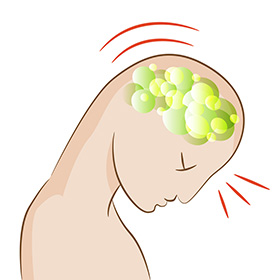by Lynn Makor and Liz Newlin
A concussion can affect a child’s ability to learn and stay focused. Regardless of the intensity of the head impact, a concussion is a type of brain injury that changes the way the brain normally works. It is caused by a bump, blow, or jolt (with or without physical contact) to the head. Concussions can occur without loss of consciousness.
Concussion Symptoms
Signs of a concussion can show up right after an injury or may not appear or be noticed until hours or days after the injury.
Physical symptoms following a concussion may include:
- Headaches
- Double vision
- Light and noise sensitivity
- Dizziness
- Lack of coordination
- Physical fatigue
Learning difficulties following a concussion may include:
- Mental fatigue
- Attention slippage
- Memory lapses
- Slower ability to take in/respond to new information
- (Possibly) Language problems
Any of these symptoms may negatively affect a student’s learning, behavior, emotional regulation, or social functioning when they return to school.
When to Get Medical Attention
If your child or teen has one or more of the symptoms below following an injury to their head or neck, seek medical attention right away.
- Appears dazed or stunned
- Is confused about events
- Answers questions slowly
- Repeats questions
- Can’t recall events prior to/after the hit, bump, or fall
- Nausea/vomiting
- Loses consciousness (even briefly)
- Shows behavioral or personality changes
- Forgets their class schedule or assignments; other memory lapses
- Unsteady on their feet
What Schools Must Do
The North Carolina State Board of Education has a policy requiring each public school to develop a plan to provide needed support for students who have been diagnosed with a concussion. Children and teens who return to school after a concussion may need to:
- Take rest breaks as needed
- Spend fewer hours at school
- Be given more time to take tests or complete assignments
- Reduce time reading or writing or in other academic tasks
- Reduce time on computers or other electronic devices
What You Can Do
Parents/caregivers can also take steps to help children return to school safely following a concussion, including the following:
- Seek/ensure treatment by a medical professional
- Find out who the “Concussion Contact” is at your child’s school
- Talk with your child’s teacher, school nurse, coach, school psychologist, and/or counselor about your child’s concussion and symptoms they are experiencing
- Provide the paperwork from your doctor, documenting the concussion and any suggested accommodations for school
- Provide ALL follow up documentation from the doctor to the appropriate school personnel
- Communicate with school staff members any concerns you have regarding your child’s recovery/functioning
Because NC’s “Return to Learn” concussion policy is new (effective July 1, 2016), you may also need to educate the child’s social worker about the new school policy. If the child has a concussion and the child has a CCNC or CC4C care manager, make sure this person is aware of the concussion so they can further advocate for support as needed.
Conclusion
Learning, behavior, and emotions can be affected in many different ways and for differing lengths of time following a concussion. It is important for parents and caregivers to know the signs and symptoms and take the necessary steps if they suspect or have knowledge that their child has sustained a concussion. When parents engage in the steps outlined above, it will ensure their child’s school is fully informed of the concussion and will assist in developing an individual plan of action in order to facilitate the child’s safe return to school.
Lynn Makor, MA, CAGS, and Liz Newlin, RN BSN, NCSN, co-chair the Children and Youth Committee of the NC Brain Injury Advisory Council.


